OpenCOBOL Manual
- 格式:doc
- 大小:74.50 KB
- 文档页数:9
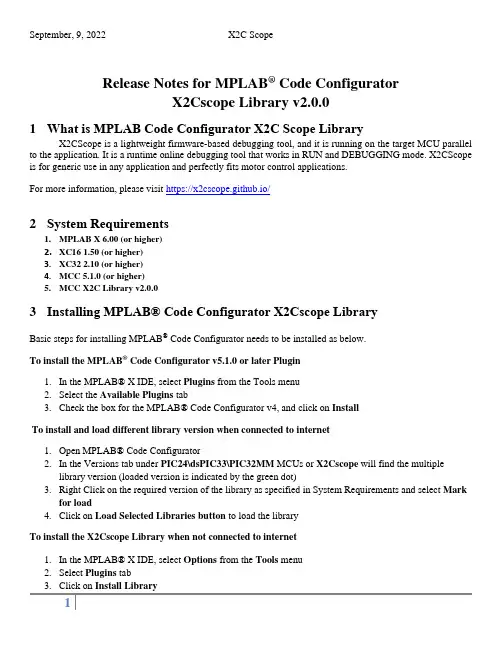
Release Notes for MPLAB® Code ConfiguratorX2Cscope Library v2.0.01What is MPLAB Code Configurator X2C Scope LibraryX2CScope is a lightweight firmware-based debugging tool, and it is running on the target MCU parallelto the application. It is a runtime online debugging tool that works in RUN and DEBUGGING mode. X2CScopeis for generic use in any application and perfectly fits motor control applications.For more information, please visit https://x2cscope.github.io/2System Requirements1.MPLAB X 6.00 (or higher)2.XC16 1.50 (or higher)3.XC32 2.10 (or higher)4.MCC5.1.0 (or higher)5.MCC X2C Library v2.0.03Installing MPLAB® Code Configurator X2Cscope LibraryBasic steps for installing MPLAB® Code Configurator needs to be installed as below.To install the MPLAB® Code Configurator v5.1.0 or later Plugin1.In the MPLAB® X IDE, select Plugins from the Tools menu2.Select the Available Plugins tab3.Check the box for the MPLAB® Code Configurator v4, and click on InstallTo install and load different library version when connected to internet1.Open MPLAB® Code Configurator2.In the Versions tab under PIC24\dsPIC33\PIC32MM MCUs or X2Cscope will find the multiplelibrary version (loaded version is indicated by the green dot)3.Right Click on the required version of the library as specified in System Requirements and select Markfor load4.Click on Load Selected Libraries button to load the libraryTo install the X2Cscope Library when not connected to internet1.In the MPLAB® X IDE, select Options from the Tools menu2.Select Plugins tab3.Click on Install Library4.Add the required version(s) of the library as specified in the System Requirements.4What’s New•Migrated X2C Scope library to MCC version 5.1.0•X2C Scope library support in MCC melody.5Supported DevicesThe X2Cscope library supports the following device families.1.dsPIC33EP512GP506 (/dsPIC33EP512GP506)2.dsPIC33EV256GM106(/dsPIC33EV256GM106)3.dsPIC33EV256GM006(/dsPIC33EV256GM006)4.dsPIC33EP128GS806 (/dsPIC33EP128GS806)5.dsPIC33EP64GS506 (/dsPIC33EP64GS506)6.dsPIC33EP512GM710(/dsPIC33EP512GM710)7.dsPIC33CH128MP508 anddsPIC33CH128MP508S1(/dsPIC33CH128MP508)8.dsPIC33CK256MP508 (/dsPIC33CK256MP508)9.dsPIC33CH512MP508 anddsPIC33CH512MP508S1(https:///dsPIC33CH512MP508)10.dsPIC33CK64MP105(https:///dsPIC33CK64MP105)6 Device Support List☑ : The X2Cscope is supported for the device.7 Customer Support7.1 Microchip Web SiteMicrochip provides online support via our web site at . This web site is used to make files and information easily available to customers. Accessible by using your favorite Internet browser, the web site contains the following information:•Product Support – Data sheets and errata, application notes and sample programs, design resources, user’s guides and hardware support documents, latest software releases and archived software •General Technical Support – Frequently Asked Questions (FAQs), technical support requests, online discussion groups/forums (), Microchip consultant program member listing •Business of Microchip – Product selector and ordering guides, latest Microchip press releases, listing of seminars and events, listings of Microchip sales offices, distributors, and factory representatives8.2Additional SupportUsers of Microchip products can receive assistance through several channels:•Distributor or Representative•Local Sales Office•Field Application Engineering (FAE)•Technical SupportCustomers should contact their distributor, representative or field application engineer (FAE) for support. Local sales offices are also available to help customers. A listing of sales offices and locations is available on our web site.Technical support is available through the web site at: 。
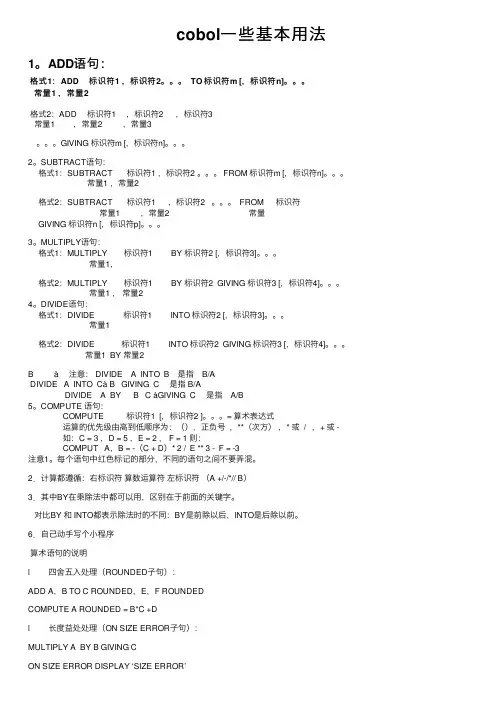
cobol⼀些基本⽤法1。
ADD语句:格式1:ADD 标识符1 ,标识符2。
TO 标识符m [,标识符n]。
常量1 ,常量2格式2:ADD 标识符1 ,标识符2 ,标识符3常量1 ,常量2 ,常量3。
GIVING 标识符m [,标识符n]。
2。
SUBTRACT语句:格式1:SUBTRACT 标识符1 ,标识符2 。
FROM 标识符m [,标识符n]。
常量1 ,常量2格式2:SUBTRACT 标识符1 ,标识符2 。
FROM 标识符常量1 ,常量2 常量GIVING 标识符n [,标识符p]。
3。
MULTIPLY语句:格式1:MULTIPLY 标识符1 BY 标识符2 [,标识符3]。
常量1,格式2:MULTIPLY 标识符1 BY 标识符2 GIVING 标识符3 [,标识符4]。
常量1 ,常量24。
DIVIDE语句:格式1:DIVIDE 标识符1 INTO 标识符2 [,标识符3]。
常量1格式2:DIVIDE 标识符1 INTO 标识符2 GIVING 标识符3 [,标识符4]。
常量1 BY 常量2B à 注意: DIVIDE A INTO B 是指 B/ADIVIDE A INTO Cà B GIVING C 是指 B/ADIVIDE A BY B C àGIVING C 是指 A/B5。
COMPUTE 语句:COMPUTE 标识符1 [,标识符2 ]。
= 算术表达式运算的优先级由⾼到低顺序为:(),正负号,**(次⽅),* 或 / ,+ 或 -如:C = 3 ,D = 5 ,E = 2 , F = 1 则:COMPUT A,B = -(C + D)* 2 / E ** 3 - F = -3注意1。
每个语句中红⾊标记的部分,不同的语句之间不要弄混。
2.计算都遵循:右标识符算数运算符左标识符(A +/-/*// B)3.其中BY在乘除法中都可以⽤,区别在于前⾯的关键字。

C/C++代码静态分析工具COBOT用户手册(V2.7)北京大学软件工程国家工程中心北京北大软件工程发展有限公司2015年02月目录1 系统说明 (3)1.1 系统架构 (3)1.2 系统界面 (4)1.3 检测流程 (6)2 缺陷检测 (7)2.1 用户登录 (7)2.1.1 管理员身份登录 (7)2.1.2 普通用户身份登录 (10)2.2 新建项目 (10)2.2.1 项目创建 (10)2.2.2 编译选择 (11)2.2.2 属性修改 (13)2.3 导入程序 (14)2.4 检测设置 (18)2.4.1 检测配置 (18)2.4.2 缺陷检测配置 (19)2.4.3 度量分析配置 (22)2.4.4 定时检测配置 (22)2.5 检测分析 (25)2.5.1 缺陷检测 (25)2.5.2 度量分析 (28)2.6 问题追踪 (29)2.7 结果导出 (33)2.8 记录查看 (33)3 环境配置 (35)3.1 基本环境要求 (35)3.2 分批检测说明 (35)1系统说明COBOT4C V2.7是由北京北大软件工程发展有限公司和北京大学软件工程国家工程研究中心联合研发的一种C程序静态分析工具,采用全新的静态分析框架,可以有效地降低误报率和漏报率。
1.1系统架构图1-1系统具有以下特点:(1)检测能力强提供统一的、可视化的集成环境,直接对代码缺陷和违反规则情况进行可配置、一体化检测。
特别为我国相关编码标准提供支持,并对经常出现指针、库函数、数值等类缺陷进行增强检测。
(2)检测精度高采用值依赖分析、指向分析、抽象解释和约束求解等众多新技术,有效地降低了缺陷的误报率和漏报率。
(3)检测效率高千行代码检测速度基本在秒级左右,对数十万行的程序,可以在30分钟内检测完毕,远快于同类产品。
(4)灵活配置用户可以根据需求,对缺陷规则以及度量分析的进行灵活选择、配置。
(5)操作简洁系统检测流程清晰,操作过程简单易懂,系统提供各种友好的操作提示,辅助用户开展代码检测工作。

COBOL to cloudStart your application modernization journeyIs cloud part of your organization’s desired business strategy?Taking your COBOL applications to the cloud shouldn’t be difficult or costly. COBOL and mainframe applications are uniquely portable and easy to redeploy to many new platforms. This includes cloud and virtual environments. And in most cases, it can happen without code changes.Retaining the business value of COBOL applications means you can innovate from a position of strength. You’ve built the business case—new market forces, customer demand, reducing cost and risk. By taking COBOL applications to a cloud or virtual environment, you are now aligning with the next generation of infrastructure modernization, giving you a powerful platform from which to compete.There are things you can do to get ready—now.Major organizations such as APRA AMCOS, DWP, and FIS have already stepped into the cloud. You can too—by developing a Destination Cloud strategy with OpenText™.3COBOL in the CloudVirtualize with Visual COBOLCOBOL’s inherent portability enables applications to be easily deployed to new platforms including Windows ®, UNIX ®, Linux ® on Intel ®, Linux ® on IBM Z ®, .Net, the Java ® Virtual Machine, containers, and the cloud.Moving COBOL applications to the cloud is as easy as deploying a current app to an alternative operating environment. Micro Focus ™ Visual COBOL by OpenText enables an easy option for deploying applications to alternative virtual environments–VMware, Microsoft ® Hyper-V ®, or other cloud-based virtualization solutions.Moving to a virtual environment enables the consolidation of multiple application workloads on a single hardware stack. This offers many benefits, including improved operational efficiency, flexibility, visibility, and cost reductions.4Leverage the power of industry-standarddevelopment toolsCOBOL in the CloudDeployed your COBOL applications to a virtual or hosted environment? It is time to determine how best to support them going forward.Developers working with Visual COBOL operate within a modernintegrated development environment (IDE) to maintain and modernize business-critical COBOL applications. Visual Studio, Visual Studio Code or Eclipse enables COBOL applications to be combined with C#, Java, and other modern languages within the cloud. It is where older applications meet new technologies to future-proof your business systems.Cloud integration with SCM systems such as Team Foundation Server provides simple and efficient application source control. Visual COBOL for Visual Studio, Visual Studio Code, or Eclipse are fully-integrated toolsets that deliver efficient enterprise application development. They ensure your first moves in the cloud are giant strides rather than baby steps. Put your best foot forward when working with COBOL applications by using Visual COBOL.5Host your virtualizedapplications offsiteCOBOL in the CloudApplication virtualization is just the first step on the road to the cloud. Your next move? Taking your COBOL applications to an offsite virtualization environment— or Infrastructure as a Service.Major cloud infrastructure service providers include Amazon Web Services, Microsoft Azure and Google Cloud.Infrastructure as a Service transfers the hardware and software resource management responsibility to your cloud infrastructure services provider so you can focus on the business rather than managing an application infrastructure. Other benefits include simplified installation, configuration, management, and licensing. Taking your COBOL applications to the cloud through your preferred infrastructure services provider is easy thanks to Visual COBOL.6Step into the cloud with a ModernizationAssessmentCOBOL in the CloudFor organizations with COBOL investments, cloud computing offers new application services and capabilities that help meet increased user demand while balancing cost. The cloud is a chance to innovate faster and with less risk.Continuous modernization is the key to this journey. This strategy enables your organization to quickly re-use and extend the value within your COBOL and mainframe applications while taking the path to the cloud that is right for your organization. Get started on your modernization journey today. 。
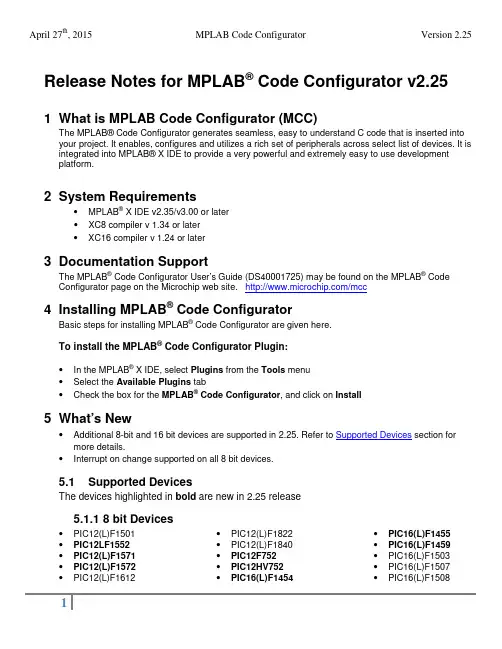
Release Notes for MPLAB® Code Configurator v2.251 What is MPLAB Code Configurator (MCC)The MPLAB®Code Configurator generates seamless, easy to understand C code that is inserted into your project. It enables, configures and utilizes a rich set of peripherals across select list of devices. It is integrated into MPLAB®X IDE to provide a very powerful and extremely easy to use development platform.2 System Requirements•MPLAB® X IDE v2.35/v3.00 or later•XC8 compiler v 1.34 or later•XC16 compiler v 1.24 or later3 Documentation SupportThe MPLAB® Code Configurator User’s Guide (DS40001725) may be found on the MPLAB® Code Configurator page on the Microchip web site. /mcc4 Installing MPLAB® Code ConfiguratorBasic steps for installing MPLAB® Code Configurator are given here.To install the MPLAB® Code Configurator Plugin:•In the MPLAB® X IDE, select Plugins from the Tools menu•Select the Available Plugins tab•Check the box for the MPLAB® Code Configurator, and click on Install5 What’s New•Additional 8-bit and 16 bit devices are supported in 2.25. Refer to Supported Devices section for more details.•Interrupt on change supported on all 8 bit devices.5.1 Supported DevicesThe devices highlighted in bold are new in 2.25 release5.1.1 8 bit Devices•PIC12(L)F1501 •PIC12LF1552 •PIC12(L)F1571 •PIC12(L)F1572 •PIC12(L)F1612 •PIC12(L)F1822•PIC12(L)F1840•PIC12F752•PIC12HV752•PIC16(L)F1454•PIC16(L)F1455•PIC16(L)F1459•PIC16(L)F1503•PIC16(L)F1507•PIC16(L)F1508•PIC16(L)F1509 •PIC16(L)F1512 •PIC16(L)F1513 •PIC16(L)F1516 •PIC16(L)F1517 •PIC16(L)F1518 •PIC16(L)F1519 •PIC16(L)F1526 •PIC16(L)F1527 •PIC16(L)F1574 •PIC16(L)F1575 •PIC16(L)F1578 •PIC16(L)F1579 •PIC16(L)F1613 •PIC16(L)F1614 •PIC16(L)F1615 •PIC16(L)F1618 •PIC16(L)F1619 •PIC16(L)F1703 •PIC16(L)F1704 •PIC16(L)F1705 •PIC16(L)F1707 •PIC16(L)F1708 •PIC16(L)F1709 •PIC16(L)F1713 •PIC16(L)F1716 •PIC16(L)F1717 •PIC16(L)F1718 •PIC16(L)F1719 •PIC16(L)F1764•PIC16(L)F1765•PIC16(L)F1768•PIC16(L)F1769•PIC16(L)F1782•PIC16(L)F1783•PIC16(L)F1784•PIC16(L)F1786•PIC16(L)F1787•PIC16(L)F1788•PIC16(L)F1789•PIC16(L)F1823•PIC16(L)F1824•PIC16(L)F1825•PIC16(L)F1826•PIC16(L)F1827•PIC16(L)F1828•PIC16(L)F1829•PIC16(L)F1847•PIC16(L)F1933•PIC16(L)F1934•PIC16(L)F1936•PIC16(L)F1937•PIC16(L)F1938•PIC16(L)F1939•PIC16(L)F1946•PIC16(L)F1947•PIC16F753•PIC16HV753•PIC16LF1554•PIC16LF1559•PIC18(L)F13K22•PIC18(L)F14K22•PIC18(L)F23K22•PIC18(L)F24K22•PIC18(L)F24K50•PIC18(L)F25K22•PIC18(L)F25K50•PIC18(L)F26K22•PIC18(L)F23K20•PIC18(L)F43K22•PIC18(L)F44K22•PIC18(L)F45K22•PIC18(L)F45K50•PIC18(L)F46K22•PIC18(L)F23K20•PIC18(L)F23K20•PIC18(L)F24K20•PIC18(L)F25K20•PIC18(L)F26K20•PIC18(L)F23K20•PIC18(L)F43K20•PIC18(L)F44K20•PIC18(L)F45K20•PIC18(L)F46K20April 27th, 2015 MPLAB Code Configurator Version 2.255.1.2 16 bit Devices•PIC24F08KA101 •PIC24FJ128GB202 •PIC24FJ64GA006•PIC24F08KA102 •PIC24FJ128GB204 •PIC24FJ64GA008•PIC24F(V)08KM101 •PIC24FJ128GB206 •PIC24FJ64GA010•PIC24F(V)08KM102 •PIC24FJ128GB210 •PIC24FJ64GA102•PIC24F(V)08KM202 •PIC24FJ128GC006 •PIC24FJ64GA104•PIC24F(V)08KM204 •PIC24FJ128GC010 •PIC24FJ64GA106•PIC24F(V)16KM102 •PIC24FJ16GA002 •PIC24FJ64GA108•PIC24F(V)16KM104 •PIC24FJ16GA004 •PIC24FJ64GA110•PIC24F(V)16KM202 •PIC24FJ192GA106 •PIC24FJ64GA202•PIC24F(V)16KM204 •PIC24FJ192GA108 •PIC24FJ64GA204•PIC24F16KA101 •PIC24FJ192GA110 •PIC24FJ64GA306•PIC24F16KA102 •PIC24FJ192GB106 •PIC24FJ64GA308•PIC24F(V)16KA301 •PIC24FJ192GB108 •PIC24FJ64GA310•PIC24F(V)16KA302 •PIC24FJ192GB110 •PIC24FJ64GB002•PIC24F(V)16KA304 •PIC24FJ256DA106 •PIC24FJ64GB004•PIC24F(V)32KA301 •PIC24FJ256DA110 •PIC24FJ64GB106•PIC24F(V)32KA302 •PIC24FJ256DA206 •PIC24FJ64GB108•PIC24F(V)32KA304 •PIC24FJ256DA210 •PIC24FJ64GB110•PIC24FJ128DA106 •PIC24FJ256GA106 •PIC24FJ64GB202•PIC24FJ128DA110 •PIC24FJ256GA108 •PIC24FJ64GB204•PIC24FJ128DA206 •PIC24FJ256GA110 •PIC24FJ64GC006•PIC24FJ128DA210 •PIC24FJ256GB106 •PIC24FJ64GC010•PIC24FJ128GA006 •PIC24FJ256GB108 •PIC24FJ96GA006•PIC24FJ128GA008 •PIC24FJ256GB110 •PIC24FJ96GA008•PIC24FJ128GA010 •PIC24FJ256GB206 •PIC24FJ96GA010•PIC24FJ128GA106 •PIC24FJ256GB210•PIC24FJ128GA108 •PIC24FJ32GA002•PIC24FJ128GA110 •PIC24FJ32GA004•PIC24FJ128GA202 •PIC24FJ32GA102•PIC24FJ128GA204 •PIC24FJ32GA104•PIC24FJ128GA306 •PIC24FJ32GB002•PIC24FJ128GA308 •PIC24FJ32GB004•PIC24FJ128GA310 •PIC24FJ48GA002•PIC24FJ128GB106 •PIC24FJ48GA004•PIC24FJ128GB108 •PIC24FJ64GA002•PIC24FJ128GB110 •PIC24FJ64GA0046 Repairs and Enhancements# ID Description Device(s)1. MCC-1456 Pin Names with special characters give warnings ingenerated code All devices2. MCC-1457 System Module EC Value does not reload All 16 bit devices3. MCC-1458 When ADC enabled and uses VREF+ and VREF- pinsmcc generates a source code where TRISA0 and TRISA1bits are cleared so it overwrites the connected referencevoltagePIC24FJ128GA204 andPIC24FJ128GB204 family4. MCC-1459 Pin 44 is not available as a PPS pin for SPI1 PIC24FJ128GC006April 27th, 2015 MPLAB Code Configurator Version 2.25 # ID Description Device(s)5. MCC-1460 Primary Oscillator range is incorrect PIC24FJ128GA204 and PIC24FJ128GB204 family6. MCC-1461 At SPI1 module SPI1_ExchangeBuffer() function uses theenhanced buffer mode of SPI but SPI1CON1L.ENHBUFbit is cleared.PIC24FJ128GA204 andPIC24FJ128GB204 family7. MCC-1284 Interrupt on change (IOC) not available All 8 bit devices8. MCC-910 Timer 0 – Incorrect Variables declared K20\K22 devices9. MCC-1290 Seed Value not getting loaded in the initializer function PIC16F161910. MCC-1470 RTCC module is missing PIC24FJ64GB004 family 7 Known IssuesThe following are enumerated issues for the MPLAB® Code Configurator.# ID Description Device(s)1. MCC-1419 Does not support both commas and periods entered in atextbox as decimal separator. Currently MCC accepts inputsonly with a period as decimal separator.All devices2. MCC-1190 Configuration setting ZCD compatible with XC8 v1.33 only PIC16(L)F161x devices3. MCC-1250MCC-1253 I2C driver errors when multiple initializer are used All 8 bit devices4. MCC-1259 Timer 2/4/6 input pins not configured as digital PIC16(L)F161x devices5. MCC-1295 I2C slave driver does not fit in RAM PIC12(L)F18226. MCC-1466 I2C PPS register value incorrect for RC3 PIC16(L)F161x devices7. MCC-1321 PPS register configuration is wrong. PIC16F17078. MCC-1102 CN\IOC functionality not supported All 16 bit devices9. MCC-1462 MCCP Compare Alert does not go away on selecting outputpin(s) All PIC24F KM devices 10. MCC-1455 Cannot set PWM2 on RA5 through APFCON PIC16(L)F1454/911. MCC-1434 Changing oscillator selection from INTOSC oscillator toexternal clock in Config1 bits does not show up 'ExternalClock' text box (in 'Clock' label) to input external clockfrequency values.PIC12LF1552,PIC16(L)F176xPIC16(L)F157x,PIC16(L)F161xApril 27th, 2015 MPLAB Code Configurator Version 2.25 8 Customer Support8.1 The Microchip Web SiteMicrochip provides online support via our web site at . This web site is used as a means to make files and information easily available to customers. Accessible by using yourfavorite Internet browser, the web site contains the following information:•Product Support – Data sheets and errata, application notes and sample programs, design resources, user’s guides and hardware support documents, latest software releases and archivedsoftware• General Technical Support – Frequently Asked Questions (FAQs), technical support requests, online discussion groups/forums (), Microchip consultant programmember listing• Business of Microchip – Product selector and ordering guides, latest Microchip press releases, listing of seminars and events, listings of Microchip sales offices, distributors and factoryrepresentatives8.2 Additional SupportUsers of Microchip products can receive assistance through several channels:•Distributor or Representative•Local Sales Office•Field Application Engineering (FAE)•Technical SupportCustomers should contact their distributor, representative or field application engineer (FAE) forsupport. Local sales offices are also available to help customers. A listing of sales offices andlocations is available on our web site.Technical support is available through the web site at: 。
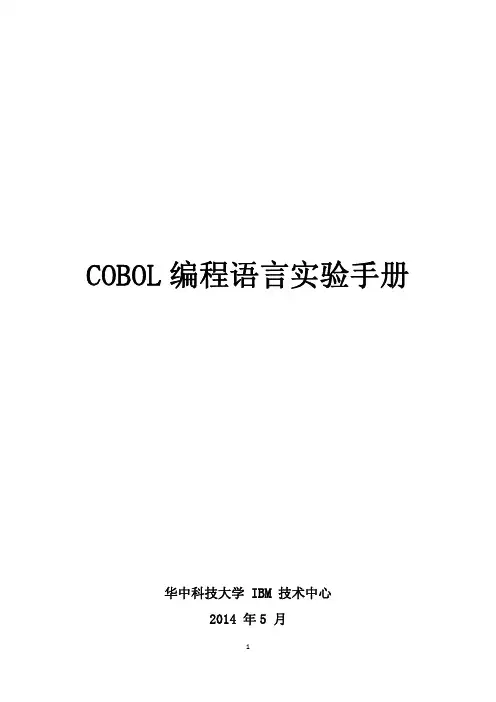
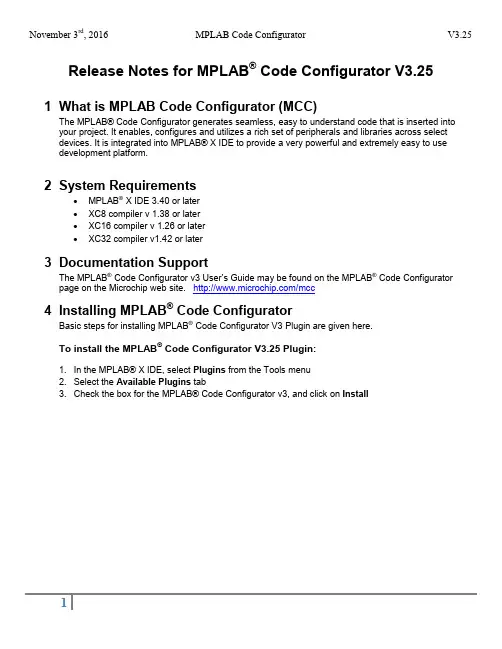
Release Notes for MPLAB® Code Configurator V3.251 What is MPLAB Code Configurator (MCC)The MPLAB®Code Configurator generates seamless, easy to understand code that is inserted into your project. It enables, configures and utilizes a rich set of peripherals and libraries across select devices. It is integrated into MPLAB®X IDE to provide a very powerful and extremely easy to use development platform.2 System Requirements∙MPLAB® X IDE 3.40 or later∙XC8 compiler v 1.38 or later∙XC16 compiler v 1.26 or later∙XC32 compiler v1.42 or later3 Documentation SupportThe MPLAB® Code Configurator v3 User’s Guide may be found on the MPLAB® Code Configurator page on the Microchip web site. /mcc4 Installing MPLAB® Code ConfiguratorBasic steps for installing MPLAB® Code Configurator V3 Plugin are given here.To install the MPLAB® Code Configurator V3.25 Plugin:1. In the MPLAB® X IDE, select Plugins from the Tools menu2. Select the Available Plugins tab3. Check the box for the MPLAB® Code Configurator v3, and click on Install5 What’s NewThe following features were added in new in MCC 3.25 release1. Help Framework Suppor t: Now MCC help or a module help is available by right clicking onmodule in Resource or Composer Area or on the icon, to get a help window similar to one listed below:2. Traffic Light Support: MCC adds support to allow libraries to release support early byproviding Red\Yellow\Green level support based on testing performed by the libraries.3. SDK Support: Changes in the software to allow developers to interface with MCC using apublished SDK available at a later date.4. MCC Plugin options and settings moved to Tools/Options/Plugins5. New Devices and peripherals are listed in the each peripheral library release notes.6 Repairs and EnhancementsThis section lists the repairs and enhancements for the plugin, for library specific issues please look at the individual library release notes.6.1 Generic7 Known IssuesThis section lists the known issues for the plugin, for library specific issues please look at the individual library release notes.7.1 WorkaroundMCCV3XX-4650: Migration from v3.0.5 to v3.25 may not work correctly. If you are using v3.0.5, to migrate from MCC 3.0.5 to MCC 3.25, first migrate from MCC 3.0.5 to MCC 3.16 and then migrate MCC 3.16 to MCC 3.25. MCC 3.16 can be obtained from /mcc from“Archive” tab.7.2 Generic8 Frequently Asked QuestionsFor frequently asked questions, please refer to the FAQ post on the MCC Forum(/forums/f293.aspx)9 Supported FamiliesFor the list of supported families, refer to the release notes of respective libraries.10 C ustomer Support10.1 The Microchip Web SiteMicrochip provides online support via our web site at . This web site is used as a means to make files and information easily available to customers. Accessible by using your favorite Internet browser, the web site contains the following information:∙Product Support – Data sheets and errata, application notes and sample programs, design resources, user’s guides and hardware support documents, latest software releases and archived software∙ General Technical Support – Frequently Asked Questions (FAQs), technical support requests, online discussion groups/forums (), Microchip consultant programmember listing∙ Business of Microchip – Product selector and ordering guides, latest Microchip press releases, listing of seminars and events, listings of Microchip sales offices, distributors and factoryrepresentatives10.2 Additional SupportUsers of Microchip products can receive assistance through several channels:∙Distributor or Representative∙Local Sales Office∙Field Application Engineering (FAE)∙Technical SupportCustomers should contact their distributor, representative or field application engineer (FAE) for support. Local sales offices are also available to help customers. A listing of sales offices and locations is available on our web site.Technical support is available through the web site at: 11 Appendix: Supported DevicesFor the list of supported devices, refer to the release notes of respective libraries.。
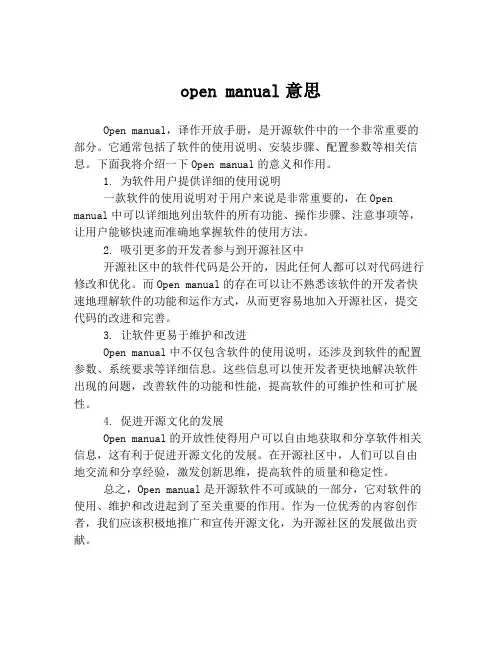
open manual意思
Open manual,译作开放手册,是开源软件中的一个非常重要的部分。
它通常包括了软件的使用说明、安装步骤、配置参数等相关信息。
下面我将介绍一下Open manual的意义和作用。
1. 为软件用户提供详细的使用说明
一款软件的使用说明对于用户来说是非常重要的,在Open manual中可以详细地列出软件的所有功能、操作步骤、注意事项等,让用户能够快速而准确地掌握软件的使用方法。
2. 吸引更多的开发者参与到开源社区中
开源社区中的软件代码是公开的,因此任何人都可以对代码进行修改和优化。
而Open manual的存在可以让不熟悉该软件的开发者快速地理解软件的功能和运作方式,从而更容易地加入开源社区,提交代码的改进和完善。
3. 让软件更易于维护和改进
Open manual中不仅包含软件的使用说明,还涉及到软件的配置参数、系统要求等详细信息。
这些信息可以使开发者更快地解决软件出现的问题,改善软件的功能和性能,提高软件的可维护性和可扩展性。
4. 促进开源文化的发展
Open manual的开放性使得用户可以自由地获取和分享软件相关信息,这有利于促进开源文化的发展。
在开源社区中,人们可以自由地交流和分享经验,激发创新思维,提高软件的质量和稳定性。
总之,Open manual是开源软件不可或缺的一部分,它对软件的使用、维护和改进起到了至关重要的作用。
作为一位优秀的内容创作者,我们应该积极地推广和宣传开源文化,为开源社区的发展做出贡献。

About the T utorialCOBOL stands for Common Business-Oriented Language. The US Department of Defense, in a conference, formed CODASYL (Conference on Data Systems Language) to develop a language for business data processing needs which is now known as COBOL.COBOL is used for writing application programs and we cannot use it to write system software. The applications like those in defense domain, insurance domain, etc. which require huge data processing make extensive use of COBOL. AudienceThis tutorial is designed for software programmers who would like to learn the basics of COBOL. It provides enough understanding on COBOL programming language from where you can take yourself to a higher level of expertise. PrerequisitesBefore proceeding with this tutorial, you should have a basic understanding of computer programming terminologies and JCL. A basic understanding of any of the programming languages will help you understand the concepts of COBOL programming and move fast on the learning track.Copyright & DisclaimerCopyright 2014 by Tutorials Point (I) Pvt. Ltd.All the content and graphics published in this e-book are the property of Tutorials Point (I) Pvt. Ltd. The user of this e-book is prohibited to reuse, retain, copy, distribute or republish any contents or a part of contents of this e-book in any manner without written consent of the publisher.We strive to update the contents of our website and tutorials as timely and as precisely as possible, however, the contents may contain inaccuracies or errors. Tutorials Point (I) Pvt. Ltd. provides no guarantee regarding the accuracy, timeliness or completeness of our website or its contents including this tutorial. If you discover any errors on our website or inthistutorial,******************************************T able of ContentsAbout the Tutorial (i)Audience (i)Prerequisites (i)Copyright & Disclaimer (i)Table of Contents ...................................................................................................................................... i i 1. OVERVIEW . (1)Introduction to COBOL (1)Evolution of COBOL (1)Importance of COBOL (1)Features of COBOL (2)2. ENVIORNMENT SETUP (3)Installing COBOL on Windows/Linux (3)Compiling COBOL Programs (3)Executing COBOL Programs (4)Executing COBOL-DB2 programs (4)Try it Option Online (6)3. PROGRAM STRUCTURE (7)Divisions (8)4. BASIC SYNTAX (12)Character Set (12)Coding Sheet (13)Character Strings (14)Comment (14)Literal (16)COBOL Word (17)5. DATA TYPES (19)Data Name (19)Level Number (20)Picture Clause (21)Value Clause (22)6. BASIC VERBS (24)Input / Output Verbs (24)Initialize Verb (25)Move Verb (26)Legal Moves (28)Add Verb (28)Subtract Verb (30)Multiply Verb (32)Divide Verb (33)Compute Statement (34)7. DATA LAYOUT (36)Redefines Clause (36)Renames Clause (37)Usage Clause (38)Copybooks (40)8. CONDITIONAL STATEMENTS (41)IF Condition Statement (41)Relation Condition (42)Sign Condition (44)Class Condition (45)Condition-name Condition (46)Combined Condition (48)Evaluate Verb (49)9. LOOP STATEMENTS (51)Perform Thru (51)Perform Until (52)Perform Times (53)Perform Varying (54)GO TO Statement (55)10. STRING HANDLING (57)Inspect (57)String (59)Unstring (60)11. TABLE PROCESSING (63)Table Declaration (63)Subscript (65)Index (66)Set Statement (67)Search (69)Search All (69)12. FILE HANDLING (72)Field (72)Record (73)File (73)13. FILE ORGANIZATION (74)Sequential File Organization (74)Relative File Organization (75)14. FILE ACCESS MODE (77)Sequential Access (77)Random Access (78)Dynamic Access (79)15. FILE HANDLING VERBS (81)Open Verb (81)Read Verb (82)Write Verb (85)Rewrite Verb (87)Delete Verb (89)Start Verb (90)Close Verb (91)16. SUBROUTINES (92)Call Verb (92)Call By Reference (92)Call By Content (94)Types of Call (95)17. INTERNAL SORT (96)Sort Verb (96)Merge Verb (98)18. DATABASE INTERFACE (101)Embedded SQL (101)DB2 Application Programming (101)Host Variables (101)SQLCA (102)SQL Queries (103)Cursors (109)19. INTERVIEW QUESTIONS (112)What is Next? (116)1. OVERVIEWIntroduction to COBOLCOBOL is a high-level language. One must understand the way COBOL works. Computers only understand machine code, a binary stream of 0s and 1s. COBOL code must be converted into machine code using a compiler. Run the program source through a compiler. The compiler first checks for any syntax errors and then converts it into machine language. The compiler creates an output file which is known as load module. This output file contains executable code in the form of 0s and 1s. Evolution of COBOLDuring 1950s, when the businesses were growing in the western part of the world, there was a need to automate various processes for ease of operation and this gave birth to a high-level programming language meant for business data processing.∙In 1959, COBOL was developed by CODASYL (Conference on Data Systems Language).∙The next version, COBOL-61, was released in 1961 with some revisions.∙In 1968, COBOL was approved by ANSI as a standard language for commercial use (COBOL-68).∙It was again revised in 1974 and 1985 to develop subsequent versions named COBOL-74 and COBOL-85 respectively.∙In 2002, Object-Oriented COBOL was released, which could use encapsulated objects as a normal part of COBOL programming.Importance of COBOL∙COBOL was the first widely used high-level programming language. It is an English-like language which is user friendly. All the instructions can be coded in simple English words.∙COBOL is also used as a self-documenting language.∙COBOL can handle huge data processing.7∙COBOL is compatible with its previous versions.∙COBOL has effective error messages and so, resolution of bugs is easier. Features of COBOLStandard LanguageCOBOL is a standard language that can be compiled and executed on machines such as IBM AS/400, personal computers, etc.Business OrientedCOBOL was designed for business-oriented applications related to financial domain, defense domain, etc. It can handle huge volumes of data because of its advanced file handling capabilities.Robust LanguageCOBOL is a robust language as its numerous debugging and testing tools are available for almost all computer platforms.Structured LanguageLogical control structures are available in COBOL which makes it easier to read and modify. COBOL has different divisions, so it is easy to debug.82. ENVIORNMENT SETUPInstalling COBOL on Windows/LinuxThere are many Free Mainframe Emulators available for Windows which can be used to write and learn simple COBOL programs.One such emulator is Hercules, which can be easily installed on Windows by following a few simple steps as given below:∙Download and install the Hercules emulator, which is available from the Hercules' home site :www.hercules-390.eu∙Once you have installed the package on Windows machine, it will create a folder like C:/hercules/mvs/cobol.∙Run the Command Prompt (CMD) and reach the directory C:/hercules/mvs/cobol on CMD.∙The complete guide on various commands to write and execute a JCL and COBOL programs can be found at:/hercules/installmvs/instmvs2.htmHercules is an open-source software implementation of the mainframe System/370 and ESA/390 architectures, in addition to the latest 64-bit z/Architecture. Hercules runs under Linux, Windows, Solaris, FreeBSD, and Mac OS X.A user can connect to a mainframe server in a number of ways such as thin client, dummy terminal, Virtual Client System (VCS), or Virtual Desktop System (VDS). Every valid user is given a login id to enter into the Z/OS interface (TSO/E or ISPF). Compiling COBOL ProgramsIn order to execute a COBOL program in batch mode using JCL, the program needs to be compiled, and a load module is created with all the sub-programs. The JCL uses the load module and not the actual program at the time of execution. The load libraries are concatenated and given to the JCL at the time of execution using JCLLIB or STEPLIB.9There are many mainframe compiler utilities available to compile a COBOL program. Some corporate companies use Change Management tools like Endevor, which compiles and stores every version of the program. This is useful in tracking the changes made to the program.//COMPILE JOB,CLASS=6,MSGCLASS=X,NOTIFY=&SYSUID//*//STEP1 EXEC IGYCRCTL,PARM=RMODE,DYNAM,SSRANGE//SYSIN DD DSN=MYDATA.URMI.SOURCES(MYCOBB),DISP=SHR//SYSLIB DD DSN=MYDATA.URMI.COPYBOOK(MYCOPY),DISP=SHR//SYSLMOD DD DSN=MYDATA.URMI.LOAD(MYCOBB),DISP=SHR//SYSPRINT DD SYSOUT=*//*IGYCRCTL is an IBM COBOL compiler utility. The compiler options are passed using the PARM parameter. In the above example, RMODE instructs the compiler to use relative addressing mode in the program. The COBOL program is passed using the SYSIN parameter. Copybook is the library used by the program in SYSLIB. Executing COBOL ProgramsGiven below is a JCL example where the program MYPROG is executed using the input file MYDATA.URMI.INPUT and produces two output files written to the spool. //COBBSTEP JOB CLASS=6,NOTIFY=&SYSUID////STEP10 EXEC PGM=MYPROG,PARM=ACCT5000//STEPLIB DD DSN=MYDATA.URMI.LOADLIB,DISP=SHR//INPUT1 DD DSN=MYDATA.URMI.INPUT,DISP=SHR//OUT1 DD SYSOUT=*//OUT2 DD SYSOUT=*//SYSIN DD *//CUST1 1000//CUST2 1001/*10The load module of MYPROG is located in MYDATA.URMI.LOADLIB. This is important to note that the above JCL can be used for a non-DB2 COBOL module only. Executing COBOL-DB2 programsFor running a COBOL-DB2 program, a specialized IBM utility is used in the JCL and the program; DB2 region and required parameters are passed as input to the utility. The steps followed in running a COBOL-DB2 program are as follows:∙When a COBOL-DB2 program is compiled, a DBRM (Database Request Module) is created along with the load module. The DBRM contains the SQL statements of the COBOL programs with its syntax checked to be correct.∙The DBRM is bound to the DB2 region (environment) in which the COBOL will run. This can be done using the IKJEFT01 utility in a JCL.∙After the bind step, the COBOL-DB2 program is run using IKJEFT01 (again) with the load library and the DBRM library as the input to the JCL.//STEP001 EXEC PGM=IKJEFT01//*//STEPLIB DD DSN=MYDATA.URMI.DBRMLIB,DISP=SHR//*//input files//output files//SYSPRINT DD SYSOUT=*//SYSABOUT DD SYSOUT=*//SYSDBOUT DD SYSOUT=*//SYSUDUMP DD SYSOUT=*//DISPLAY DD SYSOUT=*//SYSOUT DD SYSOUT=*//SYSTSPRT DD SYSOUT=*//SYSTSIN DD *DSN SYSTEM(SSID)RUN PROGRAM(MYCOBB) PLAN(PLANNAME) PARM(parameters to cobol program) - LIB('MYDATA.URMI.LOADLIB')11END/*In the above example, MYCOBB is the COBOL-DB2 program run using IKJEFT01. Please note that the program name, DB2 Sub-System Id (SSID), and DB2 Plan name are passed within the SYSTSIN DD statement. The DBRM library is specified in the STEPLIB.Try it Option OnlineYou really do not need to set up your own environment to start learning COBOL programming language. Reason is very simple, we have already set up COBOL Programming environment online, so that you can compile and execute all the available examples online at the same time, when you are doing your theory work. This gives you confidence in what you are reading and to check the result with different options. Feel free to modify any example and execute it online.Try the following example using our Try it option available alongside the code in our website.IDENTIFICATION DIVISION.PROGRAM-ID. HELLO.PROCEDURE DIVISION.DISPLAY 'Hello World'.STOP RUN.When you compile and execute the above program, it produces the following result: Hello WorldFor some of the examples given in this tutorial, you will find a Try it option in our website code sections at the top right corner that will take you to the online compiler. So just make use of it and enjoy your learning. Try it option would work only with the code compatible with OpenCOBOL. The programs that require JCL (Input file, Output file or Parameters) for execution would not run on Try it option.123. PROGRAM STRUCTUREA COBOL program structure consists of divisions as shown in the following image:A brief introduction of these divisions is given below:∙Sections are the logical subdivision of program logic. A section is a collection of paragraphs.∙Paragraphs are the subdivision of a section or division. It is either a user-defined or a predefined name followed by a period, and consists of zero or more sentences/entries.∙Sentences are the combination of one or more statements. Sentences appear only in the Procedure division. A sentence must end with a period.∙Statements are meaningful COBOL statements that perform some processing.∙Characters are the lowest in the hierarchy and cannot be divisible.You can co-relate the above-mentioned terms with the COBOL program in the following example:PROCEDURE DIVISION.A0000-FIRST-PARA SECTION.FIRST-PARAGRAPH.13ACCEPT WS-ID - Statement-1 -----|MOVE '10' TO WS-ID - Statement-2 |-- Sentence - 1DISPLAY WS-ID - Statement-3 -----|.DivisionsA COBOL program consists of four divisions.Identification DivisionIt is the first and only mandatory division of every COBOL program. The programmer and the compiler use this division to identify the program. In this division, PROGRAM-ID is the only mandatory paragraph. PROGRAM-ID specifies the program name that can consist 1 to 30 characters.Try the following example using the Try it option online.IDENTIFICATION DIVISION.PROGRAM-ID. HELLO.PROCEDURE DIVISION.DISPLAY 'Welcome to Tutorialspoint'.STOP RUN.Given below is the JCL to execute the above COBOL program.//SAMPLE JOB(TESTJCL,XXXXXX),CLASS=A,MSGCLASS=C//STEP1 EXEC PGM=HELLOWhen you compile and execute the above program, it produces the following result: Welcome to TutorialspointEnvironment DivisionEnvironment division is used to specify input and output files to the program. It consists of two sections:Configuration section provides information about the system on which the program is written and executed. It consists of two paragraphs:14o Source computer : System used to compile the program.o Object computer : System used to execute the program.∙Input-Output section provides information about the files to be used in the program. It consists of two paragraphs:o File control : Provides information of external data sets used in the program.o I-O control : Provides information of files used in the program.ENVIRONMENT DIVISION.CONFIGURATION SECTION.SOURCE-COMPUTER. XXX-ZOS.OBJECT-COMPUTER. XXX-ZOS.INPUT-OUTPUT SECTION.FILE-CONTROL.SELECT FILEN ASSIGN TO DDNAMEORGANIZATION IS SEQUENTIAL.Data DivisionData division is used to define the variables used in the program. It consists of four sections:∙File section is used to define the record structure of the file.∙Working-Storage section is used to declare temporary variables and file structures which are used in the program.∙Local-Storage section is similar to Working-Storage section. The only difference is that the variables will be allocated and initialized every time a program starts execution.∙Linkage section is used to describe the data names that are received from an external program.COBOL ProgramIDENTIFICATION DIVISION.PROGRAM-ID. HELLO.15ENVIRONMENT DIVISION.INPUT-OUTPUT SECTION.FILE-CONTROL.SELECT FILEN ASSIGN TO INPUT.ORGANIZATION IS SEQUENTIAL.ACCESS IS SEQUENTIAL.DATA DIVISION.FILE SECTION.FD FILEN01 NAME PIC A(25).WORKING-STORAGE SECTION.01 WS-STUDENT PIC A(30).01 WS-ID PIC 9(5).LOCAL-STORAGE SECTION.01 LS-CLASS PIC 9(3).LINKAGE SECTION.01 LS-ID PIC 9(5).PROCEDURE DIVISION.DISPLAY 'Executing COBOL program using JCL'.STOP RUN.The JCL to execute the above COBOL program is as follows://SAMPLE JOB(TESTJCL,XXXXXX),CLASS=A,MSGCLASS=C//STEP1 EXEC PGM=HELLO//INPUT DD DSN=ABC.EFG.XYZ,DISP=SHRWhen you compile and execute the above program, it produces the following result: Executing COBOL program using JCLProcedure Division16Procedure division is used to include the logic of the program. It consists of executable statements using variables defined in the data division. In this division, paragraph and section names are user-defined.There must be at least one statement in the procedure division. The last statement to end the execution in this division is either STOP RUN which is used in the calling programs or EXIT PROGRAM which is used in the called programs.IDENTIFICATION DIVISION.PROGRAM-ID. HELLO.DATA DIVISION.WORKING-STORAGE SECTION.01 WS-NAME PIC A(30).01 WS-ID PIC 9(5) VALUE '12345'.PROCEDURE DIVISION.A000-FIRST-PARA.DISPLAY 'Hello World'.MOVE 'TutorialsPoint' TO WS-NAME.DISPLAY "My name is : "WS-NAME.DISPLAY "My ID is : "WS-ID.STOP RUN.JCL to execute the above COBOL program://SAMPLE JOB(TESTJCL,XXXXXX),CLASS=A,MSGCLASS=C//STEP1 EXEC PGM=HELLOWhen you compile and execute the above program, it produces the following result:Hello WorldMy name is : TutorialsPointMy ID is : 12345174. BASIC SYNTAXCharacter Set'Characters' are lowest in the hierarchy and they cannot be divided further. The COBOL Character Set includes 78 characters which are shown below: Character DescriptionA-Z Alphabets(Upper Case)a-z Alphabets (Lower Case)0-9 NumericSpace+ Plus Sign- Minus Sign or Hyphen* Asterisk/ Forward Slash$ Currency Sign, Comma; Semicolon18. Decimal Point or Period" Quotation Marks( Left Parenthesis) Right Parenthesis> Greater than< Less than: Colon' Apostrophe= Equal SignCoding SheetThe source program of COBOL must be written in a format acceptable to the compilers. COBOL programs are written on COBOL coding sheets. There are 80 character positions on each line of a coding sheet.Character positions are grouped into the following five fields:Positions Field Description1-6 Column Numbers Reserved for line numbers.7 Indicator It can have Asterisk (*) indicating comments,Hyphen (-) indicating continuation and Slash (/ ) indicating form feed.198-11 Area A All COBOL divisions, sections, paragraphs andsome special entries must begin in Area A.12-72 Area B All COBOL statements must begin in area B.73-80 Identification Area It can be used as needed by the programmer.ExampleThe following example shows a COBOL coding sheet:000100 IDENTIFICATION DIVISION. 000100000200 PROGRAM-ID. HELLO. 000101000250* THIS IS A COMMENT LINE 000102000300 PROCEDURE DIVISION. 000103000350 A000-FIRST-PARA. 000104000400 DISPLAY “Coding Sheet”. 000105 000500 STOP RUN. 000106JCL to execute the above COBOL program://SAMPLE JOB(TESTJCL,XXXXXX),CLASS=A,MSGCLASS=C//STEP1 EXEC PGM=HELLOWhen you compile and execute the above program, it produces the following result:Coding Sheet20Character StringsCharacter strings are formed by combining individual characters. A character string can be a∙Comment,∙Literal, or∙COBOL word.All character strings must be ended with separators. A separator is used to separate character strings.Frequently used separators : Space, Comma, Period, Apostrophe, Left/Right Parenthesis, and Quotation mark.CommentA comment is a character string that does not affect the execution of a program. It can be any combination of characters.There are two types of comments:Comment LineA comment line can be written in any column. The compiler does not check a comment line for syntax and treats it for documentation.Comment EntryComment entries are those that are included in the optional paragraphs of an Identification Division. They are written in Area B and programmers use it for reference.The text highlighted in Bold are the commented entries in the following example: 000100 IDENTIFICATION DIVISION. 000100000150 PROGRAM-ID. HELLO. 000101000200 AUTHOR. TUTORIALSPOINT. 000102000250* THIS IS A COMMENT LINE 00010321000300 PROCEDURE DIVISION. 000104000350 A000-FIRST-PARA. 000105000360/ First Para Begins - Documentation Purpose 000106000400 DISPLAY “Comment line”. 000107 000500 STOP RUN. 000108JCL to execute above COBOL program://SAMPLE JOB(TESTJCL,XXXXXX),CLASS=A,MSGCLASS=C//STEP1 EXEC PGM=HELLOWhen you compile and execute the above program, it produces the following result: Comment Line22End of ebook previewIf you liked what you saw…Buy it from our store @ https://23。
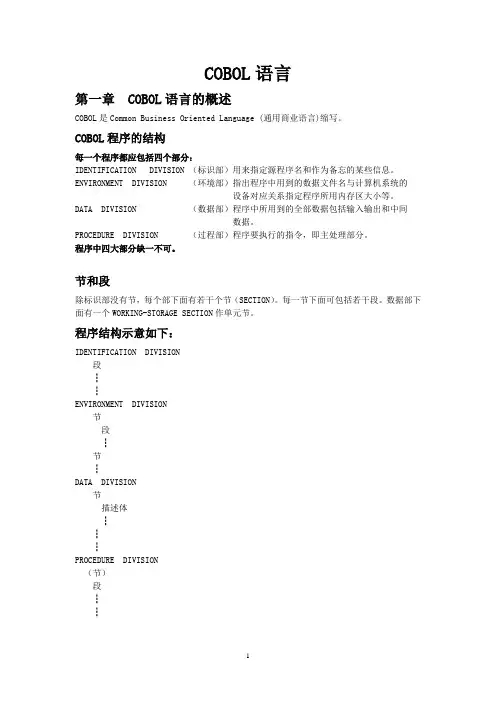
COBOL语言第一章COBOL语言的概述COBOL是Common Business Oriented Language (通用商业语言)缩写。
COBOL程序的结构每一个程序都应包括四个部分:IDENTIFICATION DIVISION (标识部)用来指定源程序名和作为备忘的某些信息。
ENVIRONMENT DIVISION (环境部)指出程序中用到的数据文件名与计算机系统的设备对应关系指定程序所用内存区大小等。
DATA DIVISION (数据部)程序中所用到的全部数据包括输入输出和中间数据。
PROCEDURE DIVISION (过程部)程序要执行的指令,即主处理部分。
程序中四大部分缺一不可。
节和段除标识部没有节,每个部下面有若干个节(SECTION)。
每一节下面可包括若干段。
数据部下面有一个WORKING-STORAGE SECTION作单元节。
程序结构示意如下:IDENTIFICATION DIVISION段┇┇ENVIRONMENT DIVISION节段┇节┇DATA DIVISION节描述体┇┇┇PROCEDURE DIVISION(节)段┇┇书写格式COBOL 程序纸每行有80列,一行分为几个区COBOL 每个句子后要加句号“.” 象 IF ELSEEND-IF. 要在END-IF 后面加句号,中间不加。
不区分大小写运算符和等号左右两边留空格。
( )左右两边留空格。
表意常量(又称字义常量,象征常数或赋形常数。
Figurative Constant )它用某些英文字(保留字)来代表某些特定的常值。
如用ZERO 代表数值0,用SPACE 代表空格。
从这些字的意思可以知道它们所代表的是什么值,因此叫表意常量或字义常量。
MOVE ZERO TO AMOVE 0 TO A表意常量可以出现在程序中使用数值常量或非数值常量的地方。
读者仔细阅读表1.2所列举的用法举例,就可清楚表意常量的作用。
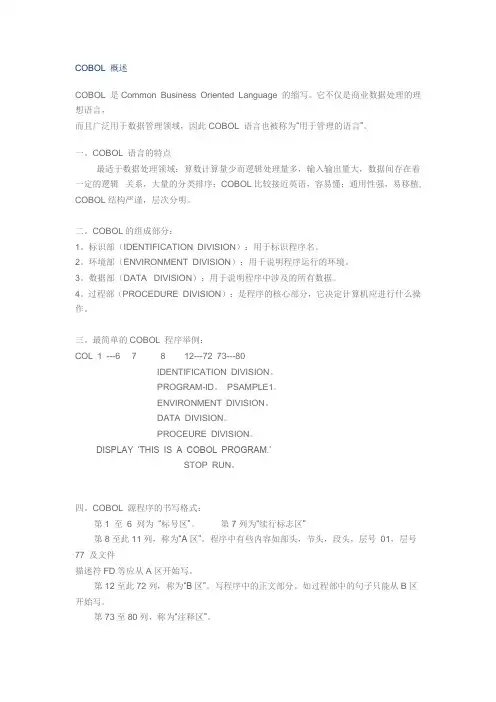
COBOL 概述COBOL 是Common Business Oriented Language 的缩写。
它不仅是商业数据处理的理想语言,而且广泛用于数据管理领域,因此COBOL 语言也被称为“用于管理的语言”。
一。
COBOL 语言的特点最适于数据处理领域:算数计算量少而逻辑处理量多,输入输出量大,数据间存在着一定的逻辑关系,大量的分类排序;COBOL比较接近英语,容易懂;通用性强,易移植, COBOL结构严谨,层次分明。
二。
COBOL的组成部分:1。
标识部(IDENTIFICATION DIVISION):用于标识程序名。
2。
环境部(ENVIRONMENT DIVISION):用于说明程序运行的环境。
3。
数据部(DATA DIVISION):用于说明程序中涉及的所有数据。
4。
过程部(PROCEDURE DIVISION):是程序的核心部分,它决定计算机应进行什么操作。
三。
最简单的COBOL 程序举例:COL 1 ---6 7 8 12---72 73---80IDENTIFICATION DIVISION。
PROGRAM-ID。
PSAMPLE1。
ENVIRONMENT DIVISION。
DATA DIVISION。
PROCEURE DIVISION。
DISPLAY …THIS IS A COBOL PROGRAM.‟STOP RUN。
四。
COBOL 源程序的书写格式:第1 至6 列为“标号区”。
第7列为“续行标志区”第8至此11列,称为“A区”。
程序中有些内容如部头,节头,段头,层号01,层号77 及文件描述符FD等应从A区开始写。
第12至此72列,称为“B区”。
写程序中的正文部分。
如过程部中的句子只能从B区开始写。
第73至80列,称为“注释区”。
五。
COBOL字符集包括:数字0 --- 9 ,字母A--- Z ,a --- z , 专用字符:+ - * / = , . ; … ( ) < > $ 及空格。
COBOL-IT® Developer StudioGetting StartedThe Remote System PerspectiveVersion 2.1ContentsACKNOWLEDGMENT (3)COBOL-IT DEVELOPER STUDIO TOPICS (4)Introduction and License Terms (4)COBOL-IT Developer Studio License terms (4)Dependencies (5)Dependencies and Comments (5)The COBOL-IT Developer Studio Distribution (5)THE REMOTE SYSTEMS PERSPECTIVE (7)Configuring the Remote Systems Perspective (7)Window>Preferences>General>Network Connections>SSH2 (7)Window>Preferences>General>Workspace (8)Window>Preferences>COBOL>License file path (8)Window>Preferences>Run/Debug>Perspectives>... .. (9)Opening the Remote System Explorer (10)Window>Open Perspective>Other>Remote System Explorer (10)Using The Remote System View (11)Remote System View>Define a connection to remote system (11)Enter Host Name, or IP Address (11)Remote System View>[Host Name]>[Dropdown]>Connect (12)View of the Remote Systems view when logged in (13)File>New>Project>COBOL>COBOL Project (14)Working in a remote project (15)Remote Run in Debug (18)Re-opening a Remote Project (20)FAQ (20)Copy and Paste files from a local machine to a remote machine (20)Copyright 2008-2020 COBOL-IT S.A.R.L. All rights reserved. Reproduction of this document in whole or in part, for any purpose, without COBOL-IT'sexpress written consent is forbidden.Contact Information: The Lawn22-30 Old Bath RoadNewbury, Berkshire, RG14 1QN United KingdomTel: +44-0-1635-565-200Microsoft and Windows are registered trademarks of the Microsoft Corporation. UNIX is a registered trademark of the Open Group in the United States and other countries. Other brand and product names are trademarks or registered trademarks of the holders of those trademarks.Introduction and License TermsCOBOL-IT Developer Studio License termsThis document describes how to use the COBOL-IT Developer Studio Remote System Perspective. COBOL-IT Developer Studio is COBOL-IT’s eclipse-based development environment, designed to support users of the COBOL-IT Compiler Suite.The copyright for the COBOL-IT Developer Studio® is wholly owned by COBOL-IT.Any unauthorized reproduction of the software without the express written consent of COBOLIT is prohibited.For more information, please contact us at: ********************COBOL-IT Corporate Headquarters are located at: The Lawn22-30 Old Bath RoadNewbury, Berkshire, RG14 1QN United Kingdom Tel: +44-0-1635-565-200COBOL-IT, COBOL-IT Compiler Suite, CitSQL, CitSORT, and COBOL-IT Developer Studio are trademarks or registered trademarks of COBOL-IT. Eclipse is a trademark of the Eclipse Foundation.IBM, and AIX are registered trademarks of International Business Machines Corporation. Linux is a registered trademark of Linus Torvalds.Windows, Visual Studio, and Visual Studio Express are registered trademarks of Microsoft Corporation.Java and Solaris are registered trademarks of Sun Microsystems, Inc. UNIX is a registered trademark of The Open Group HP is a registered trademark of Hewlett Packard, Inc. Red Hat is a registered trademark of Red Hat, Inc.All other trademarks are the property of their respective owners.The COBOL-IT Developer Studio DistributionDependency Comment“C” compilerThe COBOL-IT Compiler requires a “C” compiler. While mostLinux>Unix installations will include a “C” compiler, many Windows installations will not. Windows users can download the Visual Studio from .COBOL-IT CompilerSuiteThe COBOL-IT Compiler Suite, Standard Edition can be downloaded at the COBOL-IT Online Portal. For access to the COBOL-IT Online Portal, please contact your sales representative at ******************. Java RuntimeEnvironment (JRE)The COBOL-IT Developer Studio Kepler build can be run with the Java Runtime Environment (JRE) Version 1.6 or greater. The COBOL-IT Developer Studio Neon build can be run with the JRE Version 1.8 or greater.EclipseEclipse is included with the download of Developer Studio.The COBOL-IT Developer Studio requires that the COBOL-IT Compiler Suite already be installed on the host platform, and that a “C” compiler be installed on the host platform. The COBOL-IT Developer Studio is an Eclipse plug-in, and as such, requires that Eclipse be installed on the host platform. Eclipse, in turn, requires that a Java Runtime Environment (JRE) be installed on the host platform.For Windows-based installations, the COBOL-IT Developer Studio, Enterprise Edition can be downloaded from the COBOL-IT online portal with a login and password provided by your sales representative.The COBOL-IT Developer Studio, Enterprise Edition is available with Subscription. TheCOBOL-IT Developer Studio, Enterprise Edition provides functionality with the installation of several Perspectives:• Developer Studio Perspective in which users set up and build COBOL projects, using a locally installed version of the COBOL-IT Compiler Suite Enterprise Edition. The Developer Studio Perspective additionally provides access to Code Coverage and Profiling Tools. • Debugger Perspective providing access to a feature-rich COBOL debugger both locally, and on Remote SystemsDependencies and CommentsDependenciesGetting StartedThe Remote System Perspective Version 2.1•Remote Systems Perspective, allowing use of Compiler, Runtime, and Debugger functionalities installed on remote servers.•Git and RSEGit Perspectives, providing users with full access to the Git/Github Source Code Control System.•Data Displayer Perspective, providing access to a tool for browsing and modifying data in indexed, sequential and relative files.•Planning Perspective, providing access to the Mylyn Task Manager.•For more information about the usage of Git/RSEGit, Data Displayer, Mylyn Task Manager, and Code Coverage, see the Getting Started with the Developer Studio- The Utilities Manual.•Using the COBOL-IT Developer Studio requires a license for both the COBOL-IT Compiler Suite Enterprise Edition, and COBOL-IT Developer Suite.Getting StartedThe Remote System PerspectiveVersion 2.1Configuring the Remote Systems PerspectiveWindow>Preferences>General>Network Connections>SSH2The Remote Systems Perspective allows the user to connect to remote systems and perform all of the Developer Studio functions.The Remote System Perspective is enabled with the Enterprise Edition of the Developer Studio, Compiler Suite on the local machine, and Compiler Suite on the remote machine.Eclipse settings for the Remote System Perspective are stored in Window>Preferences>Remote Systems. No changes need to be made.COBOL-IT uses an SSH Connection to the Remote System.You can store the user-name and password for the login to the remote system in Window>Preferences>Remote Systems>Passwords.Configuring your development environment using the Window>Preferences>General,Window>Preferences>COBOL, and Window>Preferences>Run/Debug dialog screens causes the settings to be applied at the Workspace level. Settings applied at the Workspace level are applied automatically to all Projects in a Workspace.When connecting to a Server on the Cloud, you may need to define a Private Key.Window>Preferences>COBOL>License file pathThe screen print above shows the suggested settings for : Build automatically ( off ). This can also be toggled off at the main menubar Project>Build Automatically function.Refresh automatically ( on ).When the compile generates output files into the Project folders and subfolders, it is convenient to have the folders auto-refresh, and show the files. If Refresh automatically is set to (off), you must use the manual Refresh, located on the right-click dropdown menu on the Project folder in the Navigator window.Save automatically before build (on). This can be a matter of personal preference. It isconvenient to be able to code, and then compile, without first having manually clicked on a Save function. With this function set to (on), using the Build, or Clean and Build functions will automatically cause the source to be SAVE’d before compiling.The Enterprise Edition License file gives the user access to Remote Compile/Run/Debug capabilities. However, it does not serve as a license file to the remotely-located compiler. The remotely-located compiler is licensed separately, and that license will be validated when theWindow>Preferences>General>WorkspaceWindow>Preferences>Run/Debug>Perspectives>…compiler is launched at the remote location.The Enterprise Edition license file is emailed to Customers with Subscriptions. Store the file in a directory of your choice. Then, use the Browse interface in Window>Preferences>COBOL to locate the license file, select it, and click on “Apply”. Click “OK” to close the Window>Preferences>COBOL dialog window.Enter the license path of the locally-installed Develolper Studio. The license file must not be modified in any way. Any modifications to the license file render it invalid.Set “Open the associated perspective when launching” to “Always”. This will cause the Debug Perspective to be opened whenever a Debug command is launched.Getting StartedThe Remote System Perspective Version 2.1 ArrayOpening the Remote System ExplorerWindow>Open Perspective>Other>Remote System ExplorerSelect Window>Open Perspective>Other.In the Open Perspective dialog screen, select Remote System Explorer.Remote System View>Define a connection to remote systemEnter Host Name, or IP AddressIn the Remote System View, click on Define a connection to remote systemOn the New Connection dialog screen, select SSH Only. Click on the “Next” button to continue.On the New Connection dialog screen, enter the host name of the remote machine.The host name can be entered either as the name of the machine ( for example sun01 ) or as an IP address.Click on the Finish button to proceed to the password screen.Using The Remote System ViewRemote System View>[Host Name]>[Dropdown]>ConnectThe Remote System View provides you with a tree structure based on the Host Name/IP Address. Select the Host Name/IP Address. Right-click and select Connect from the dropdown menu.On the Enter Password Dialog Screen, enter the User ID, and Password. Note that the User IDand password can be saved, making future attachments to the remote machine automatic.Getting StartedThe Remote System Perspective Version 2.1 Note- This login can be pre-configured in Window>Preferences>Remote Systems>Passwords View of the Remote Systems view when logged inHaving logged into “My Home”, you see that “My Home” now provides a view of the files and directories in the login directory on the remote system.File>New>Project>COBOL>COBOL ProjectWhen you have logged into the remote machine, you work in the Developer Studio and Debugger Perspective interfaces. For example, to create a new project, select File>New>Project. In this exercise, we will create a project using existing source code.Name the project in the “Project name:” entry field.Select “Create project at existing location (from existing source).Dropdown the Host combobox, and select the [Hostname/IP Address] you are working on. Click on the Browse button, and browse to the location of the existing source code.Click Finish.Set Project PropertiesIn Project>Properties>COBOL Properties>DevOps Tools>Debugging Tools, select the -gcompiler flag, to allow debugging.In Project>Properties>COBOL Properties>Standard Options, select the -o compiler flag option,Working in a remote projectand enter ./object into the corresponding entry-field.Build the ProjectSelect the project, and right-click to open a drop-down menu. From the drop-down menu, select “Build Project” to build the project.Refresh the ProjectAfter the build is complete, right-click on the Project Name in the Navigator View, and select the Refresh function to refresh the view of the project and view the newly created files.Run the ProjectSelect holidaysIX.cbl, right-click and select Run As… from the drop-down menu to open theRun Configuration wizard.We have named our our configuration holidaysIX.cbl. On the Main tab, verify that that holidaysIX.cbl in project1 is selected. On the Runtime tab, verify the runtime settings. On the environment tab, set COB_FILE_PATH to ./data and COB_LIBRARY_PATH to ./object. Set COB_ERROR_FILE to coberr.txt. Click Apply, and then click on the Run button.The program will run, creating indexed, relative and sequential files. We see our output in the Terminal window.Remote Run in DebugRefresh the ProjectAfter the build is complete, right-click on the Project Name in the Navigator View, and select the Refresh function to refresh the view of the project and view the newly created files.Select the program you wish to run in debug mode, and click on the Debug button.In the example below, the program holidaysIX.cbl is run in debug mode. Note that in the original configuration, the debugger was configured to launch automatically when a program was run in debug mode.For further details on running a program in debug mode see Getting Started with the Developer Studio using the Debugger Perspecitve.Copy and Paste files from a local machine to a remote machineFAQWhen you re-open a previously created remote project, Eclipse shows the remote project in the Navigator View. To log in to the remote machine, and see the expanded view of the project, double-click on the remote proect name.In Local Files, select a directory (asampleprj in the image below). Right click on the selecteddirectory, and select “Copy”, or press “Ctrl+C”.Re-opening a Remote ProjectThen, scroll down to the view of the remote machine, and select “My Home”. Right click on the selected directory, and select “Paste”, or press “Ctrl+V”. A pop-up window advises you of the status of the file transfers taking place.June, 2020。
COBOL概述COBOL概述什么是COBOL语⾔:COBOL是Common Business Oriented Language的缩写,是⾯向商业通⽤编程语⾔。
它是专门为商业数据处理⽽设计的计算机⾼级程序语⾔。
⼴泛⽤于数据管理领域。
应⽤于多个⾏业如:银⾏,证券,⾦融,制造,等等。
COBOL程序的基本结构:标识部(IDENTIFICATION DIVISION)⽤来标识程序名称,记录程序的⽂档记录住处如作者和⽇期等。
环境部(ENVIRONMENT DIVISION)⽤来描述程序运⾏和编译的计算机环境,内部数据⽂件与系统设备的对应关系。
数据部(DATA DIVISION)定义程序中所有数据的类型和所占内在的⼤⼩。
过程部(PROCEDURE DIVISION)编写程序要执⾏的语句,是程序的核⼼。
部下设置节,节下设置段或描述体,段下或节⼀包含句⼦。
节是由⼀个或者多个段组成的。
节的定义从⼀个节名开始到下⼀个节名或⽂本结束为⽌。
定义格式:节名 SECTION(节名分为系统定义和⽤户定义两种。
)段由⼀个或多个句⼦组成,段的定义从段名开始到下⼀个段名或⽂本结束为⽌。
定义格式:段名.(段名+点)(段名分为系统定义和⽤户⾃定义两种)⽂件描述体只能在数据部中定义,⽤于描述外部⽂件的属性及其记录的格式。
定义格式:FD ⽂件名. (⽂件描述体⽤FD(file definition)语句定义)。
句⼦是完整的指令,⽤相应的动词表⽰其操作,以⼀个句号加⼀个以上的空格来结束。
COBOL程序的书写区域标准COBOL程序每⾏80列,被分为五⼈区域。
第01——06列为“标识区”标号是6位数字,应从⼩到⼤,但不⼀定连续,标号只是⽅便查阅程序,可以省略。
第7列为“注释区”“*”:表⽰本⾏为注释⾏,⽤于注释程序说明。
第08——11列为“A区”程序中⼀列语句必须从该区开始书写:部名、节名、段名,描述符(FD),01和07层。
第12——72列为“B区”程序正⽂部分,过程部语句必须从该区开始书写。
OpenCL(Open Computing Language)是一个用于编写在异构系统上运行的程序的框架,其中包括CPU、GPU和其他处理器。
OpenCL提供了一种方式来编写并行计算的程序,并可以在不同的平台上运行而无需修改代码。
OpenCL开发包括以下几个步骤:
1. 查询可用的平台和设备:OpenCL应用程序首先需要查询系统上可用的平台和设备。
平台是OpenCL框架的集合,设备则是可以在其上执行OpenCL作业的硬件单元。
2. 创建OpenCL上下文:上下文是OpenCL API调用的基础,它包含了执行OpenCL代码所需的所有信息。
应用程序需要选择一个平台并创建一个上下文。
3. 创建命令队列:命令队列是用于控制作业执行的通信通道。
应用程序将命令发送到队列中,然后由OpenCL运行时系统逐个执行这些命令。
4. 创建和编译程序对象:程序对象是包含可执行代码的实体,可以将其视为包含一个或多个内核的库。
应用程序需要创建程序对象并编译它以生成可执行代码。
5. 创建和设置内核:内核是执行实际计算任务的函数。
应用程序需要创建内核对象,并设置其参数以定义计算任务。
6. 执行内核:应用程序通过将内核对象提交到命令队列中来执行内核。
提交内核后,应用程序可以等待内核完成执行或继续执行其他任务。
7. 读取结果:当内核完成执行后,应用程序可以从设备内存中读取结果数据。
在开发OpenCL应用程序时,需要注意一些关键点,例如内存管理、数据传输性能和调试技巧。
同时,为了获得最佳性能,需要对目标硬件进行优化,并使用适当的算法和数据结构来处理并行计算任务。
Step-by-step: the path from COBOL to mobileCreating an Air Miles Calculator demo in Visual COBOLStartThe move to mobile starts here A step-by-step guide to developing mobile apps using Visual COBOL.If you think mobile is beyond the capabilities of COBOL technology, think again – it’s easy to embrace mobile technology with Visual COBOL using this simple step-by-step guide.As developers, we have to act fast to keep up with enduser demands, one being the growth in mobile use, and the corresponding demand for mobile access to applications. With Visual COBOL, delivering great mobile apps doesn’t have to be complicated. Follow this guide, download the sample code provided, and see how you can develop a new mobile application based on your existing COBOL code.We’ve documented the process to show you just how easy it can be.Get started nowBring your application functionality togetherOnce you’ve decided on the key functions, isolate this code from the rest of the main application. Y ou might need to strip away code to achieve this, especially if there is an existing user interface in place. Now is also a good time to identify any application dependencies since these must be available too (or deleted out of the code if not required).Your goal is to arrive at a callable API that provides access to discrete functions for your mobile application. Y our existing application may already have this API architecture in place, in which case you won’t need to worry about this. Otherwise, look to bring your application functionality together under a single program or series of programs that can be called directly to provide the results. Remember, web services are generally stateless architectures – so you should treat every invocation as the initial program call and initialize elements, such as data items and opening files, as you need them. SOA approaches like REST pass state between client and server within the HTTP request, allowing you to pick up from where you last left off for any given user request.You can also take care of these aspects later on from the comfort of an IDE. You may also be wondering how to keep data and data files separate from another user request. Visual COBOL actually provides call containers (we call them run units) which run your procedural COBOL programs in isolation from the same set of programs that may be supporting another user’s request.1of 3Java or .NET based infrastructureThe next stage is thinking about the architecture of your application and the tools you’ll need to do the job. First you need to decide whether to base the application on a Java or .NET based infrastructure (you may already have an in-house standard defined). Either way, Visual COBOL enables you to compile your COBOL API directly to Java byte code or Microsoft Intermediate Language so it can run directly inside either the Java Virtual Machine or the .NET CLR.This means you can draw on tools in JVM and .NET to enhance your mobile application – here is what you’ll need: A web server orapplication serverThe mobile client will be sendingHTTP requests to the COBOL systemand these need to be processedand returned as HTML web pagesfor the client’s mobile browser.If you’re a Java-based companyand already have a Java AppServer available, use the Java AppServer, or consider an open sourcesolution such as T omcat. [Link to:http:// ] If yourarchitecture preference is .NET you’llneed Microsoft IIS installed. If youdon’t have IIS installed, Visual Studioincludes a limited version you canuse to get started.PortabilityBy choosing to build an HTML5application, the challenge of portabilitymoves from the device into thebrowser. While HTML5 offers goodcoverage, we still need to think aboutJavaScript for web programming.Fortunately, it’s a problem the softwareindustry has addressed – there arenow plenty of portable JavaScriptlibraries you can use. In this example,we’re utilizing a popular frameworkcalled jQuery. The jQuery Mobileextensions will provide us not only witha portable JavaScript library, but also arich, touchresponsive user experiencefor the end users.AJAX& JSONThe HTML5 application will needto communicate with a server-side COBOL service which we’llenable using web services. Webservice requests are achieved usingAsynchronous JavaScript and XML(or AJAX for short). The content ofthe request will be transmitted usingJavaScript Object Notation (or JSONfor short). APIs for both of thesecapabilities are available within thejQuery framework.What’s next?Watch the video showing how we built the appGet started! Take a free Visual COBOL trial and download the application code。
OpenCOBOL Manual †erManual/1Getting StartedHello World!This is a sample program that displays "Hello World":---- hello.cob -------------------------* Sample COBOL programIDENTIFICATION DIVISION.PROGRAM-ID. hello.PROCEDURE DIVISION.DISPLAY "Hello World!".STOP RUN.----------------------------------------The compiler is cobc, which is executed as follows:$ cobc hello.cob$ ./helloHello World!The executable file name (i.e., hello in this case) is determined by removing the extension from the source file name.You can specify the executable file name by specifying the compiler option -o as follows:$ cobc -o hello-world hello.cob$ ./hello-worldHello World!erManual/2_1CompileThis chapter describes how to compile COBOL programs using OpenCOBOL Compiler OptionsThe compiler cobc accepts the options described in this section.1 Build TargetThe following options specify the target type produced by the compiler:-EPreprocess only. Compiler directives are executed. Comment lines are removed. COPY statements are expanded. The output goes to the standard-out.-CTranslation only. COBOL source files are translated into C files. The output is saved in file *.c.-SCompile only. Translated C files are compiled by cc. The output is saved in file *.s.-cCompile and assemble. This is equivalent to cc -c. The output is saved in file *.o.-mCompile, assemble, and build a dynamic-linking module (i.e., a shared library). Theoutput is saved in file *.so. Without any options above, the compiler tries to build anexecutable.When you build an executable, the compiler implicitly gives the option `-fmain', which includes a main function in the output file.-fmainInclude the main function in the output.This option takes effect at the translation stage. If you give this option with -C, youwill see the main function at the end of the generated C file.2 Source FormatOpenCOBOL supports both fixed and free source format.The default format is the fixed format. This can be explicitly overwritten by one of the following options:-freeFree format.-fixedFixed format.3 Warning Options-WallEnable all warnings-Wcolumn-overflowWarn any text after column 72-Wend-evaluateWarn lacks of END-EVALUATE-Wend-ifWarn lacks of END-IF-WparenthesesWarn lacks of parentheses around AND within ORerManual/2_2Multiple SourcesA program often consists of multiple source files. This section describes how tocompile multiple source files.This section also describes how to build a shared library that can be used by anyCOBOL programs and how to use external libraries from COBOL programs.1 Static LinkingThe easiest way of combining multiple files is to compile them into a single executable.Compile each file with the option -c, and link them at the end. The top-level program must be compiled with the option -fmain:$ cobc -c subr1.cob$ cobc -c subr2.cob$ cobc -c -fmain main.cob$ cobc -o prog main.o subr1.o subr2.oYou can link C routines as well:$ cc -c subrs.c$ cobc -c -fmain main.cob$ cobc -o prog main.o subrs.oAny number of functions can be contained in a single C file.The linked programs will be called dynamically; that is, the symbol will be resolved at run time. For example, the following COBOL statementCALL "subr" USING X.will be converted into an equivalent C code like this:int (*func)() = cob_resolve("subr");if (func != NULL)func (X);With the compiler options -fstatic-call, more efficient code will be generated like this: subr(X);Note that this option is effective only when the called program name is a literal (like CALL "subr".). With a data name (like CALL SUBR.), the program is still called dynamically.2 Dynamic LinkingThe main program and subprograms can be compiled separately.The main program is compiled as usual:$ cobc -o main main.cobSubprograms are compiled with the option -m:$ cobc -m subr.cobThis creates a module file subr.so (The extension varies depending on your host.).Before running the main program, install the module files in your library directory:$ cp subr.so /your/cobol/libNow, set the environment variable COB_LIBRARY_PATH to your library directory, and run the main program:$ export COB_LIBRARY_PATH=/your/cobol/lib$ ./main3 Building LibraryYou can build a shared library by combining multiple COBOL programs and even C routines:$ cobc -c subr1.cob$ cobc -c subr2.cob$ cc -c subr3.c$ cc -shared -o libsubrs.so subr1.o subr2.o subr3.o4 Using LibraryYou can use a shared library by linking it with your main program.Before linking the library, install it in your system library directory:$ cp libsubrs.so /usr/libor install it somewhere else and set LD_LIBRARY_PATH:$ cp libsubrs.so /your/cobol/lib$ export LD_LIBRARY_PATH=/your/cobol/libThen, compile the main program, linking the library as follows:$ cobc main.cob -L/your/cobol/lib -lsubrserManual/2_3C InterfaceThis chapter describes how to combine C programs with COBOL programs.1 Main C ProgramInclude libcob.h in your C program. Call cob_init before using any COBOL module:#include <libcob.h>intmain(int argc, char **argv){/* initialize your program */.../* initialize the COBOL run-time library */cob_init(argc, argv);/* rest of your program */...}You can write cobc_init(0, NULL); if you do not want to pass command line arguments to COBOL.The function cob_set_library_path will overwrite the user setting of the environment variable COB_LIBRARY_PATH.You can compile your C program as follows:$ cc -c `cob-config --cflags` main.cThe compiled object must be linked with libcob as follows:$ cc -o main main.o `cob-config --libs`2 Static C to COBOLLet's call the following COBOL module from a C program:---- say.cob ---------------------------IDENTIFICATION DIVISION.PROGRAM-ID. say.ENVIRONMENT DIVISION.DATA DIVISION.LINKAGE SECTION.01 HELLO PIC X(6).01 WORLD PIC X(6).PROCEDURE DIVISION USING HELLO WORLD.DISPLAY HELLO WORLD.EXIT PROGRAM.------------------------------------------------------------This program accepts two arguments, displays them, and exit.From the viewpoint of C, this is equivalent to a function having the following prototype:extern int say(char *hello, char *world);So, your main program will look like as follows:---- hello.c ---------------------------#include <libcob.h>extern int say(char *hello, char *world);intmain(){int ret;char hello[6] = "Hello ";char world[6] = "World!";cob_init(0, NULL);ret = say(hello, world);return ret;}----------------------------------------Compile these programs as follows:$ cc -c `cob-config --cflags` hello.c$ cobc -c -static say.cob$ cobc -o hello hello.o say.o$ ./helloHello World!3 Dynamic C to COBOLYou can find a COBOL module having a specific PROGRAM-ID by using a C functioncob_resolve, which takes the module name as a string and returns a pointer to the module function.cob_resolve returns NULL if there is no module. In this case, the function cob_resolve_error returns the error message.Let's see an example:---- hello-dynamic.c -------------------#include <libcob.h>static int (*say)(char *hello, char *world);intmain(){int ret;char hello[6] = "Hello ";char world[6] = "World!";cob_init(0, NULL);/* find the module with PROGRAM-ID "say". */say = cob_resolve("say");/* if there is no such module, show error and exit */if (say == NULL) {fprintf(stderr, "%s\n", cob_resolve_error ());exit(1);}/* call the module found and exit with the return code */ret = say(hello, world);return ret;}----------------------------------------Compile these programs as follows:$ cc -c `cob-config --cflags` hello-dynamic.c$ cobc -o hello hello-dynamic.o$ cobc -m say.cob$ export COB_LIBRARY_PATH=.$ ./helloHello World!4 Static COBOL to CLet's call the following C function from COBOL:---- say.c -----------------------------intsay(char *hello, char *world){int i;for (i = 0; i < 6; i++)putchar(hello[i]);for (i = 0; i < 6; i++)putchar(world[i]);putchar('\n');return 0;}----------------------------------------This program is equivalent to the foregoing say.cob.Note that, unlike C, the arguments passed from COBOL programs are not terminated by the null character (i.e., \0).You can call this function in the same way you call COBOL programs:---- hello.cob -------------------------IDENTIFICATION DIVISION.PROGRAM-ID. hello.ENVIRONMENT DIVISION.DATA DIVISION.WORKING-STORAGE SECTION.01 HELLO PIC X(6) VALUE "Hello ".01 WORLD PIC X(6) VALUE "World!".PROCEDURE DIVISION.CALL "say" USING HELLO WORLD.STOP RUN.----------------------------------------Compile these programs as follows:$ cc -c say.c$ cobc -c -static -fmain hello.cob$ cobc -o hello hello.o say.o$ ./helloHello World!5 Dynamic COBOL to CYou can create a dynamic-linking module from a C program by passing an option -shared to the C compiler:$ cc -shared -o say.so say.c$ cobc hello.cob$ export COB_LIBRARY_PATH=.$ ./helloHello World!erManual/3Customize1 Customizing CompilerThese settings are effective at compile-time.Environment variables (default value):COB_CCC compiler ("gcc")COB_CFLAGSFlags passed to the C compiler ("-I$(PREFIX)/include")COB_LDFLAGSFlags passed to the C compiler ("")COB_LIBSStandard libraries linked with the program ("-L$(PREFIX)/lib -lcob") COB_LDADDAdditional libraries linked with the program ("")2 Customizing LibraryThese settings are effective at run-time.Environment variables (default value):COB_LIBRARY_PATHDynamic-linking module path (".:$(PREFIX)/lib/open-cobol")COB_DYNAMIC_RELOADINGSet to "yes" if modules must be reloaded when they are replaced ("no")erManual/4Optimize1 Optimize OptionsThere are two compiler options for optimizations: -O and -O2. These options enable optimization at both translation (from COBOL to C) and compilation (C to assembly) levels. Currently, there is no difference between -O and -O2 at the translation level. The only thing which is done is inlining some run-time functions, by enabling the option -fruntime-inlining(see Compiler Options).The option -O or -O2 is passed to the C compiler as it is and used for C level optimization.2 Optimize CallWhen a CALL statement is executed, the called program is linked at run time. By specifying the compiler option -fstatic-call, you can statically link the program at compile time and call it efficiently. (see Static Linking)3 Optimize BinaryBy default, data items of usage binary or comp are stored in the big-endian form. On those machines whose native byte order is little-endian, this is not quite efficient.If you prefer, you can store binary items in the native form of your machine. Set the config option binary-byteorder to native in your config file (see Customize).In addition, setting the option binary-size to 2-4-8 or 1-2-4-8 is more efficient than others.erManual/5Debug1 Debug OptionsThe compiler option -debug can be used during the development of your programs. It enables all run-time error checking, such as subscript boundary checks and numeric data checks, and displays run-time errors with source locations.The compiler option -g includes line directives in the output. This helps debugging your COBOL programs using GDB, but this feature is not complete and not very useful yet.。